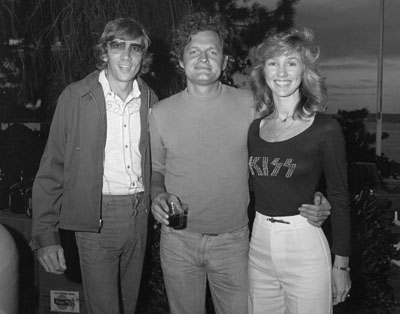Inside the
Summer Issue:
Writers Wanted:
Join Circle!
High School Principal
Follows Through On
Harry's Challenge
Better Place To Be
Is Scientist's Goal
Readers Help Shape
Circle! Through
Survey Feedback
Fan Fare
John McMenamin
Insider's Guide To
The Chapin Family
Weekend At Ovens Park
One Woman's
Simple Question
Yields A Harvest
of Food For The Hungry
Behind The Song:
What Made
America Famous?
What Made
America Famous?
Made Radio Program
Director Infamous
Choosing to Matter
Clipping Coupons
for Charities
DJ's Community
Activism Remembered
New Stage Production
Offers Harry Memorabilia
to Benefit WHY
WHY Visits
the Today Show
Click to read
the Winter 2004 Issue
Click to read
the Fall 2003 Issue
"What Made America Famous?"
Made Radio Program Director Infamous
by Gerry Cagle
When Circle! was researching Harry Chapin stories, someone told someone who told someone else that I had once programmed "What Made America Famous?" every hour for an entire day on KHJ radio in Los Angeles. I was asked to write about it.
Harry Chapin is one of my closest friends. I say, is, because his spirit is very much a part of my life. Evidently, Harry's ability to twist the slightest nuance into a novella rubbed off on me. This isn't a simple story. Or maybe it is. But it isn't a short story. And without the beginning, there could be no end.
So bear with me through the opening verses.
I first met Harry Chapin in the early '70s when I was programming WRKO, a radio station in Boston. We had just received word that the station had scored the highest ratings in its history and I had been celebrating by drinking straight tequila for a couple of hours. The staff was hammered and I was actually sitting under my desk with the remainder of the bottle when my assistant informed me that Harry Chapin had dropped by with a record promoter. I, of course, told her I was in no condition to see anyone. Harry, of course, wouldn't take no for an answer. He came into my office, crawled under the desk and we finished the bottle of tequila.
It was the beginning of the most wonderful friendship I have ever experienced.
 |
| Gerry and Christy Cagle with Harry |
As those of you who are reading this know, it was difficult to convince Top 40 radio programmers to play Harry's music. His songs were most often too long, too complicated and considered "tempo challenged" in the world of Top 40 when he first began recording. I had many arguments with Harry regarding his writing. He explained to me that his writing was art and he wouldn't compromise his art to fit into a specific format. I argued that if he was a true genius, he could create a wonderful piece of art that fit within a frame.
There was never a compromise.
I loved Harry's music — the long songs, the short songs, the complicated songs, the songs that made me feel uncomfortable, the songs that made me cry, the songs that made me laugh and most importantly, the songs that made me think — which was a part of all of his music. I wanted to share my love with my listeners. So I played them all. "Taxi." "W-O-L-D." "Circle." Other album cuts that "didn't belong" on Top 40 radio.
At the time, I worked for the largest radio company in the country: RKO. If the RKO chain didn't play a record, it wouldn't make it into the Top 10. No other programmer in the chain shared my passion for Harry Chapin's music — at least not enough to program it on their stations. So I was the lone voice crying out in the wilderness.
Kind of like Harry.
I argued with Paul Drew, the head of programming for the chain, and tried to convince him to program Harry's music on more of our stations. He calmly refused, insisting that we wait until Harry recorded a certified hit before jeopardizing the reputation of the chain.
In the meantime, I was transferred to KHJ in Los Angeles, the flagship station for RKO. And Harry recorded what I believed was a certified hit. "What Made America Famous?" would soon make me infamous-at least within the RKO chain.
I played the song for Drew and asked that we feature the song on the 4th of July. I was stunned when Drew not only acquiesced, but suggested that we play it every hour on the hour. I couldn't wait to share the news with Harry. I produced a special introduction that dripped with patriotism while praising Harry's genius. We challenged each listener to listen to the song and "do something." Paul even had KFRC in San Francisco do the same.
The rest, is history — as in "history."
What happened? Nothing. The request lines didn't blow up. The record didn't sell. "What Made America Famous?" didn't do the same for Harry. Or me.
Paul Drew then told me that I had to give my Harry Chapin advocation a rest.
Harry and I shared another bottle of tequila.
The record company released the next single shortly thereafter. I explained to Harry that I couldn't play it early. After being the first (and many times the only) programmer to play his records, I was forced to wait on the next one.
It was "Cat's In The Cradle." His biggest hit.
Harry and I had many laughs about that. His biggest fan, the Top 40 programmer who played more of his records than any other wasn't responsible for his biggest hit.
In the life and times I shared with Harry Chapin, it was the perfect irony.
Gerry Cagle was the program director of KHJ radio in Los Angeles during the mid 1970s.
Watch for the Next Issue of Circle! on September 7
